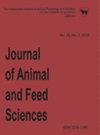Assessment of the ability of dietary yeast-fermented rapeseed meal to modulate inflammatory and oxidative stress in piglets after weaning
IF 1.5
4区 农林科学
Q3 AGRICULTURE, DAIRY & ANIMAL SCIENCE
引用次数: 2
Abstract
The ban on the use of antibiotics in feed (EC, 2006) has had a significant impact on the livestock sector, especially for pigs after weaning (Taranu et al., 2015). Consequently, it is necessary to find new sources of antimicrobial compounds, which has opened up many opportunities for animal nutrition research. The processing of plants (oilseeds, cereals, medicinal plants, etc.) for feed or food, or non-food products (e.g. oil, alcohol, kerosene, etc.) generates a wide range of by-products with significant ABSTRACT. The aim of the study was to investigate the potential of a diet containing rapeseed meal fermented by Saccharomyces cerevisiae as a new sustainable feed to reduce transient intestinal inflammation, diarrhoea and oxidative stress in piglets after weaning. In this study, 16 male post-weaning piglets, with an initial weight of 9.04 ± 0.19 kg, were randomly allocated to two dietary treatments: control and 10% fermented rapeseed meal (FRSM) – 8 pigs/treatment. The experiment lasted 21 days. At the end of the trial, the animals were slaughtered and samples of blood and segments of the jejunum, ileum and colon were collected for determination of plasma biochemical, inflammatory and oxidative stress parameters. Pig performance and diarrhoea incidence were also investigated. The results showed that the FRSM diet had no significant effect on piglet performance, weight and average daily weight gain, as well as plasma biochemical parameters. However, the number of piglets with diarrhoea was higher in the control group than in the group receiving the FRSM diet throughout the experimental period. Moreover, a decrease in TNF-α (P = 0.03) and IL-1ß (P < 0.05) cytokine levels was recorded in the colon and jejunum samples from the FRSM group. In addition, IL-8 and IL-6 concentrations were decreased (P = 0.0009 and P = 0.03, respectively) in the ileum of piglets fed FRSM, indicating the modulatory capacity of this feed in reducing weaning-associated intestinal inflammation. The FRSM diet also improved the antioxidant status and significantly reduced lipid peroxidation and thiobarbituric acid reactive substance levels in plasma (P = 0.022) and in the jejunum (P = 0.028) and colon (P = 0.003), suggesting the potential of fermented rapeseed meal to limit oxidative reactions. In conclusion, the present study showed that fermentation of rapeseed meal using S. cerevisiae enriched the nutrient composition and reduced the concentration of anti-nutrients (e.g. glucosinolates). Moreover, the addition of FRSM to diets of pigs after weaning improved their intestinal health status, indicating its beneficial effect. Received: 14 January 2022 Revised: 7 March 2022 Accepted: 5 April 2022日粮酵母发酵油菜籽对断奶仔猪炎症和氧化应激调节能力的评估
禁止在饲料中使用抗生素(EC,2006)对畜牧业产生了重大影响,尤其是对断奶后的猪(Taranu等人,2015)。因此,有必要寻找新的抗菌化合物来源,这为动物营养研究开辟了许多机会。用于饲料或食品的植物(油籽、谷物、药用植物等)或非食品(如油、酒精、煤油等)的加工会产生一系列具有重要“摘要”意义的副产品。本研究的目的是研究含有酿酒酵母发酵菜籽粕的日粮作为一种新的可持续饲料的潜力,以减少断奶后仔猪的短暂肠道炎症、腹泻和氧化应激。在本研究中,16头断奶后雄性仔猪,初始体重为9.04±0.19 kg,被随机分配到两个日粮处理:对照和10%发酵菜籽粕(FRSM)-8头/处理。实验持续了21天。试验结束时,屠宰动物,采集血液样本和空肠、回肠和结肠段,以测定血浆生化、炎症和氧化应激参数。还对猪的性能和腹泻发生率进行了调查。结果表明,FRSM日粮对仔猪生产性能、体重、平均日增重及血浆生化指标无显著影响。然而,在整个实验期间,对照组腹泻仔猪的数量高于接受FRSM饮食的组。此外,在FRSM组的结肠和空肠样本中,TNF-α(P=0.03)和IL-1ß(P<0.05)细胞因子水平下降。此外,喂食FRSM的仔猪回肠中的IL-8和IL-6浓度降低(分别为P=0.0009和P=0.03),表明该饲料在减少断奶相关肠道炎症方面的调节能力。FRSM饮食还改善了抗氧化状态,并显著降低了血浆(P=0.022)、空肠(P=0.028)和结肠(P=0.003)中的脂质过氧化和硫代巴比妥酸反应物质水平,这表明发酵菜籽粕有可能限制氧化反应。总之,本研究表明,使用酿酒酵母发酵菜籽粕丰富了营养成分,降低了抗营养物质(如硫代葡萄糖苷)的浓度。此外,在断奶后的猪日粮中添加FRSM改善了它们的肠道健康状况,表明其有益效果。接收日期:2022年1月14日修订日期:2022年底3月7日接受日期:2022年初4月5日
本文章由计算机程序翻译,如有差异,请以英文原文为准。
求助全文
约1分钟内获得全文
求助全文
来源期刊

Journal of Animal and Feed Sciences
农林科学-奶制品与动物科学
CiteScore
2.10
自引率
0.00%
发文量
42
审稿时长
3 months
期刊介绍:
Journal of Animal and Feed Sciences (JAFS, J. Anim. Feed Sci.) has been published by the Kielanowski Institute of Animal Physiology and Nutrition, Polish Academy of Sciences in Jabłonna (Poland) since 1991. It is a continuation of the Polish-language journal Roczniki Nauk Rolniczych. Seria B, Zootechniczna published by the Polish Academy of Sciences since 1969.
JAFS is an international scientific journal published quarterly, about 40 papers per year including original papers, short communications and occasionally reviews. All papers are peer-reviewed and related to basic and applied researches in the field of animal breeding and genetics, physiology of nutrition, animal feeding, feed technology and food preservation. The journal distinguishes the multidisciplinary nature of physiological and nutritional sciences and so includes papers specialized in all fields connected with animal well-being, including molecular and cell biology and the emerging area of genetics.
 求助内容:
求助内容: 应助结果提醒方式:
应助结果提醒方式:


